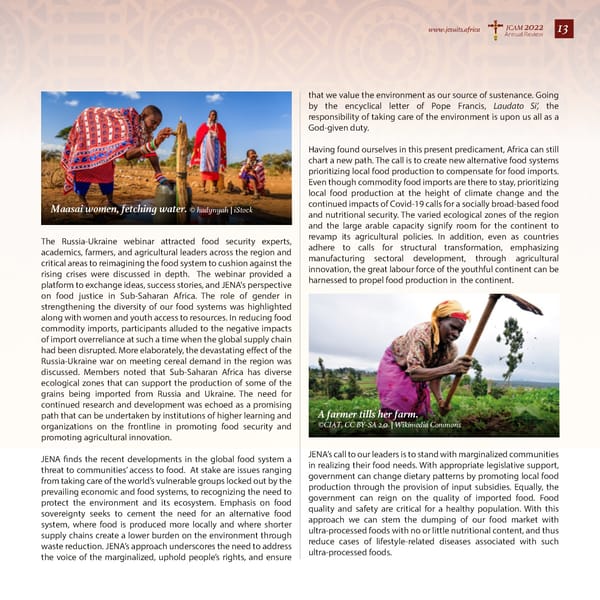www.jesuits.africa JCAM 2022 Annual Review 13 that we value the environment as our source of sustenance. Going by the encyclical letter of Pope Francis, Laudato Si’, the responsibility of taking care of the environment is upon us all as a God-given duty. Having found ourselves in this present predicament, Africa can still chart a new path. The call is to create new alternative food systems prioritizing local food production to compensate for food imports. Even though commodity food imports are there to stay, prioritizing local food production at the height of climate change and the Maasai women, fetching water.© hadynyah | iStock continued impacts of Covid-19 calls for a socially broad-based food and nutritional security. The varied ecological zones of the region and the large arable capacity signify room for the continent to The Russia-Ukraine webinar attracted food security experts, revamp its agricultural policies. In addition, even as countries academics, farmers, and agricultural leaders across the region and adhere to calls for structural transformation, emphasizing critical areas to reimagining the food system to cushion against the manufacturing sectoral development, through agricultural rising crises were discussed in depth. The webinar provided a innovation, the great labour force of the youthful continent can be platform to exchange ideas, success stories, and JENA's perspective harnessed to propel food production in the continent. on food justice in Sub-Saharan Africa. The role of gender in strengthening the diversity of our food systems was highlighted along with women and youth access to resources. In reducing food commodity imports, participants alluded to the negative impacts of import overreliance at such a time when the global supply chain had been disrupted. More elaborately, the devastating effect of the Russia-Ukraine war on meeting cereal demand in the region was discussed. Members noted that Sub-Saharan Africa has diverse ecological zones that can support the production of some of the grains being imported from Russia and Ukraine. The need for continued research and development was echoed as a promising A farmer tills her farm. path that can be undertaken by institutions of higher learning and organizations on the frontline in promoting food security and ©CIAT, CC BY-SA 2.0 | Wikimedia Commons promoting agricultural innovation. JENA finds the recent developments in the global food system a JENA’s call to our leaders is to stand with marginalized communities threat to communities’ access to food. At stake are issues ranging in realizing their food needs. With appropriate legislative support, from taking care of the world’s vulnerable groups locked out by the government can change dietary patterns by promoting local food prevailing economic and food systems, to recognizing the need to production through the provision of input subsidies. Equally, the protect the environment and its ecosystem. Emphasis on food government can reign on the quality of imported food. Food sovereignty seeks to cement the need for an alternative food quality and safety are critical for a healthy population. With this system, where food is produced more locally and where shorter approach we can stem the dumping of our food market with supply chains create a lower burden on the environment through ultra-processed foods with no or little nutritional content, and thus waste reduction. JENA’s approach underscores the need to address reduce cases of lifestyle-related diseases associated with such the voice of the marginalized, uphold people’s rights, and ensure ultra-processed foods.
 Jesuits Africa Annual Review 2022 Page 12 Page 14
Jesuits Africa Annual Review 2022 Page 12 Page 14